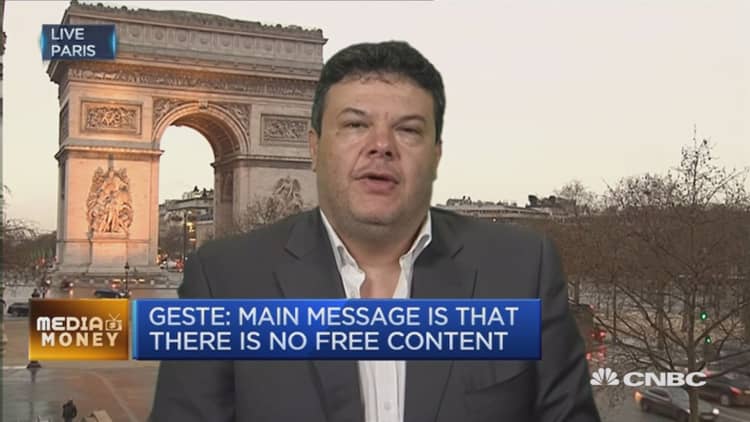
French newspapers are so unhappy with people using adblockers when accessing their sites that they have begun to ban people using the software from accessing their websites, in a move denounced as "hysteria" by one adblocking firm.
The latest measure from leading news sites such as Le Monde and Le Figaro It is the latest battle in the war between publishers desperate to create sustainable revenue streams and adblockers. Advertising is a key source of revenue for online publishers but adblocking has put that under threat.
"The contact with the users is that you can pay, or you should accept advertisement. This is a contract and it's important," Emmanuel Parody, secretary general of Le Geste, the body that represents online publishers who organized the anti-adblock action, told CNBC by phone.
"This is a starting point for a new debate."
Major French news sites, including Le Monde and Le Figaro participated in the campaign, but each took a different tactic. Sports publication L'Equipe, for example, had a complete block on content for anyone using adblockers. Le Monde, on the other hand, displayed a message telling people to turn off their ad blockers and this caused the screen to blur.
Adblocking has been on the rise. Use of the software grew 41 percent in the 12 months to August 2015 and there are now 198 million active adblock users around the world, according PageFair. Ad blocking was estimated to cost advertisers $22 billion last year.
In a survey conducted by Adobe of 260 adults, 42 percent of people said they feel adblocking improves the performance of their computer. Bad adverts – those that cause web pages to load slowly as well as irrelevant ones – are reasons often cited by people who install adblockers.
New ways of advertising
The majority of the complaints about online ads concern "programmatic advertising" – an automated process of buying and placing ads on a page based on data collected about users. This has meant ads that are not relevant to users can often be served onto pages. Because it's an automated process, publications often have no control over what ads are shown, something Parody admits is an issue.
"More than half of the global advertising budget will grow through programmatic. Ten years ago you could say no to an advertisement because you have something to say about the format. Now you're like the reader, you discover what is happening after the ad is displayed, that is why it's more difficult to manage this," Parody told CNBC.
French newspapers are not the only group to decry adblocking software. The likes of Google and Yahoo recently clashed with adblocking software provider Shine, calling its solution "blunt". Still, a number of players are struggling to contain the rise of the software.
On top of this, technology firms and mobile operators are supporting adblockers. Last year, Apple introduced the option for adblocking on its Safari web browser on mobile devices. In addition, mobile operator 3 this year struck a deal with Shine to introduce adblocking across its U.K. and Italian networks.
'Hysteria'
Israeli adblocking firm Shine unsurprisingly denounced the move by French publishers, saying that it's merely a short-term action.
"I believe this reaction is more out of hysteria than a thoughtful strategy," Roi Carthy, chief marketing officer at Shine, told CNBC by phone.
"If publishers feel the best strategy is to demotivate consumers by locking out their content, I'm sure consumers will prove to them that they will go elsewhere and not return."
Carthy, like Parody, blames the rise of advertising technology such as programmatic, for the popularity of adblockers, suggesting that publishers cannot be sure that their readers' data is safe and they aren't been served any viruses.
"Publishers cannot ensure their audience is not abused by adtech," Carthy added.






